选修7 Unit 4 reading 课件[下学期]
文档属性
| 名称 | 选修7 Unit 4 reading 课件[下学期] |
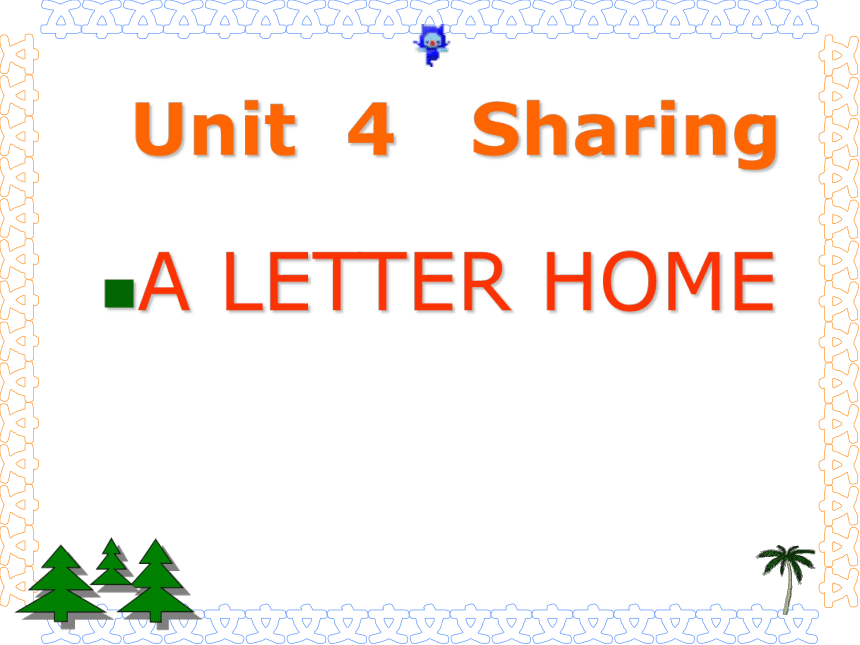
|
|
| 格式 | rar | ||
| 文件大小 | 7.1MB | ||
| 资源类型 | 教案 | ||
| 版本资源 | 通用版 | ||
| 科目 | 英语 | ||
| 更新时间 | 2006-11-26 00:00:00 | ||
图片预览

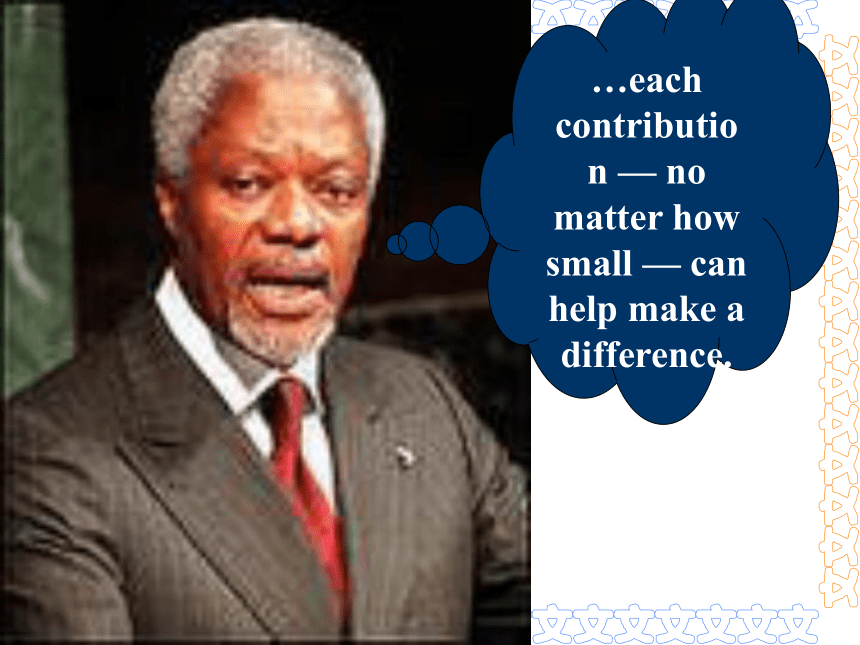
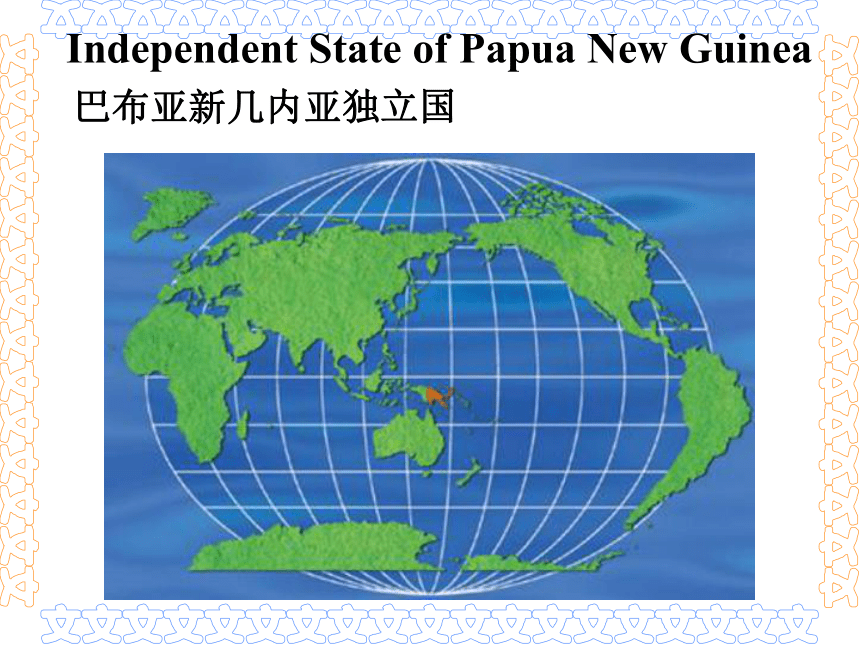
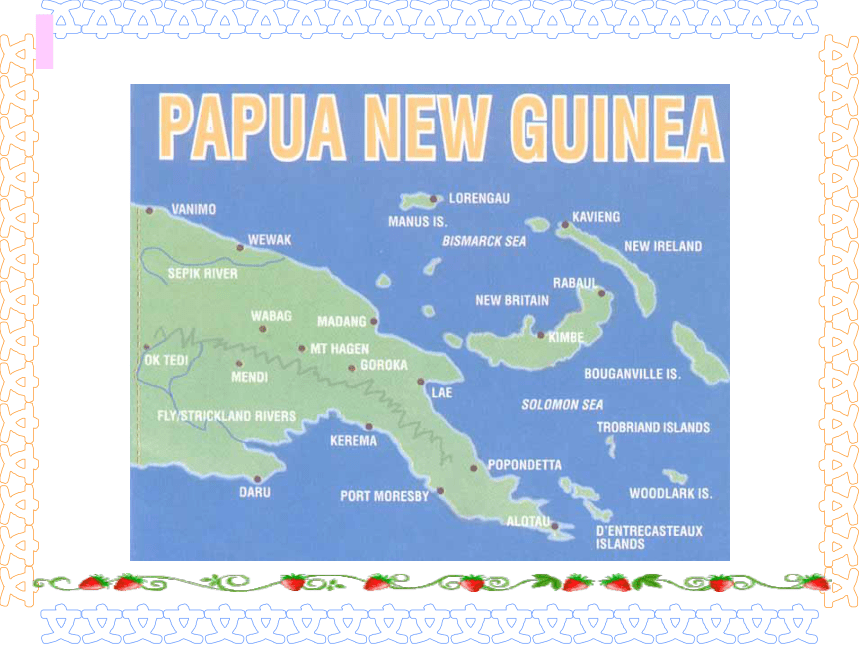
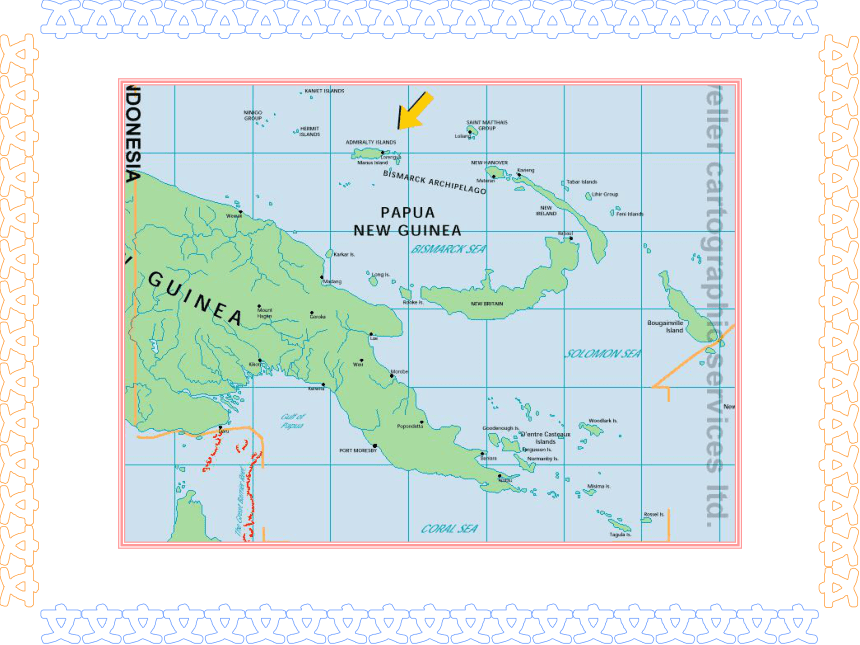
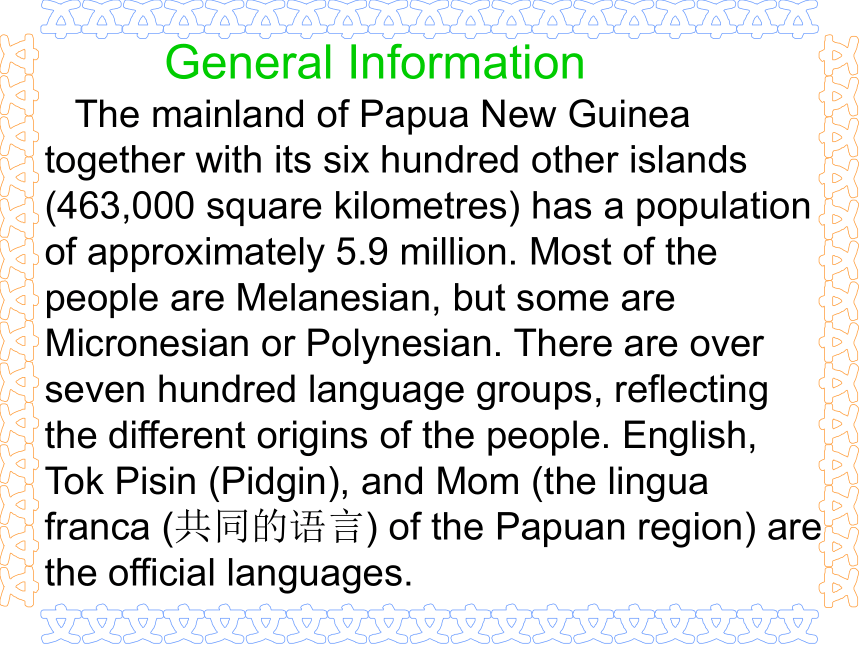
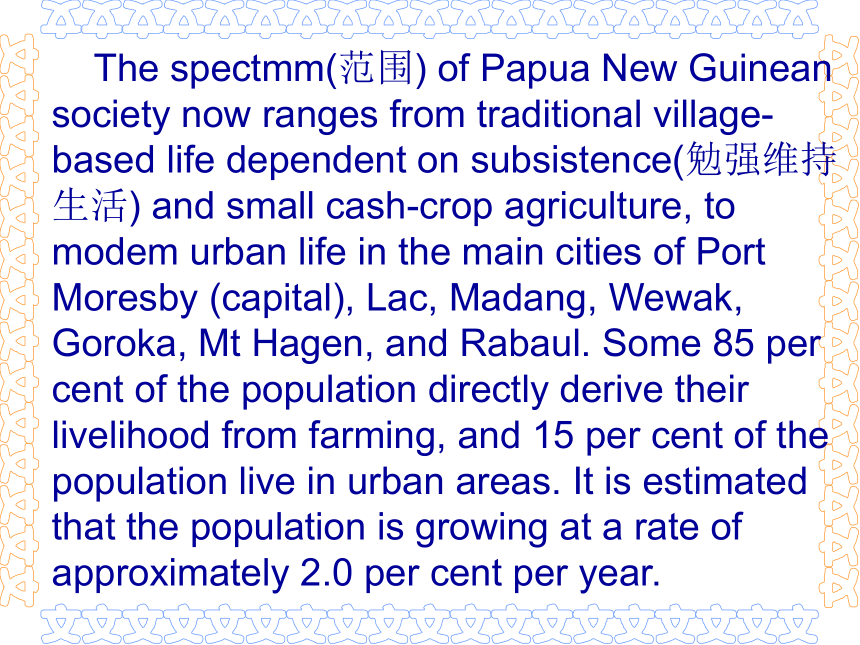
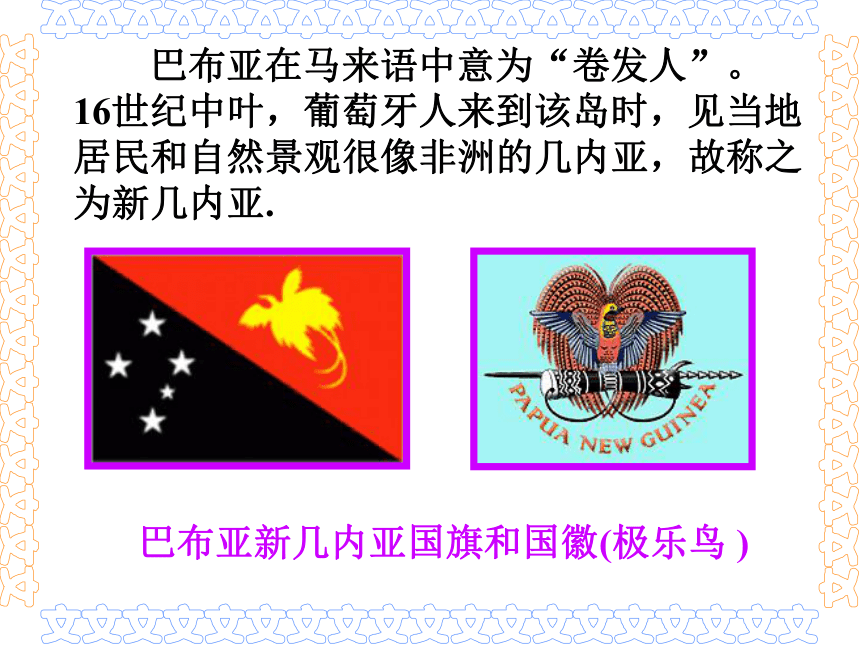
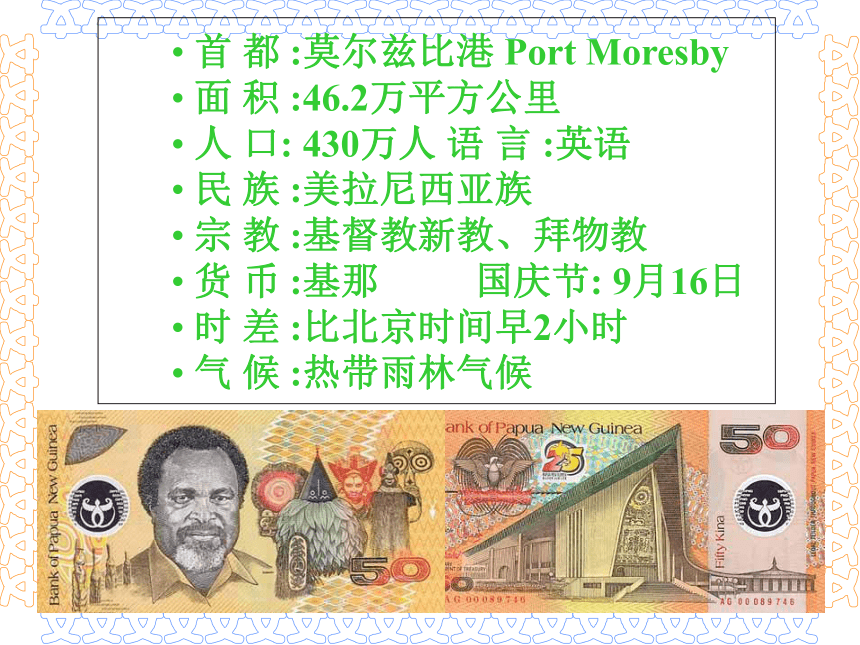

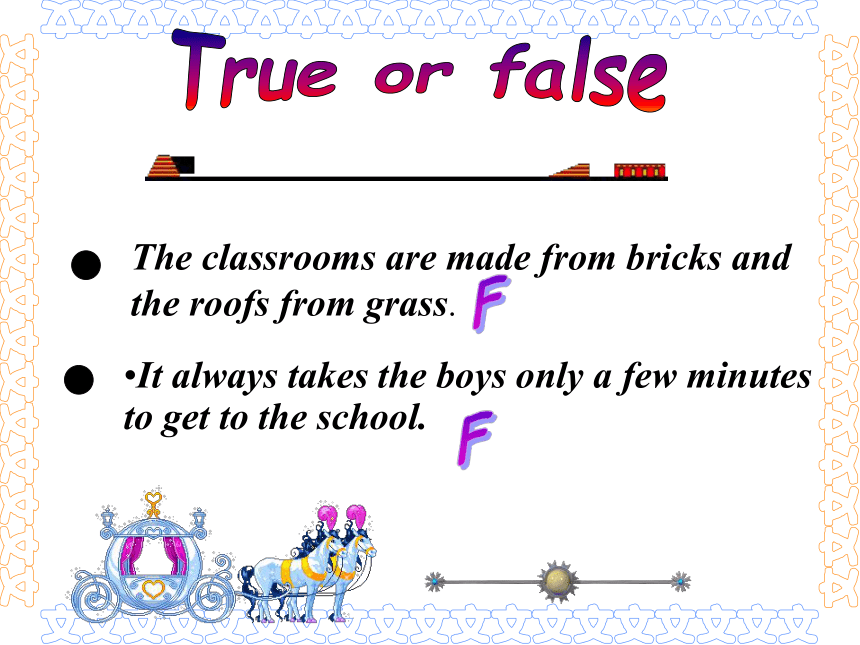
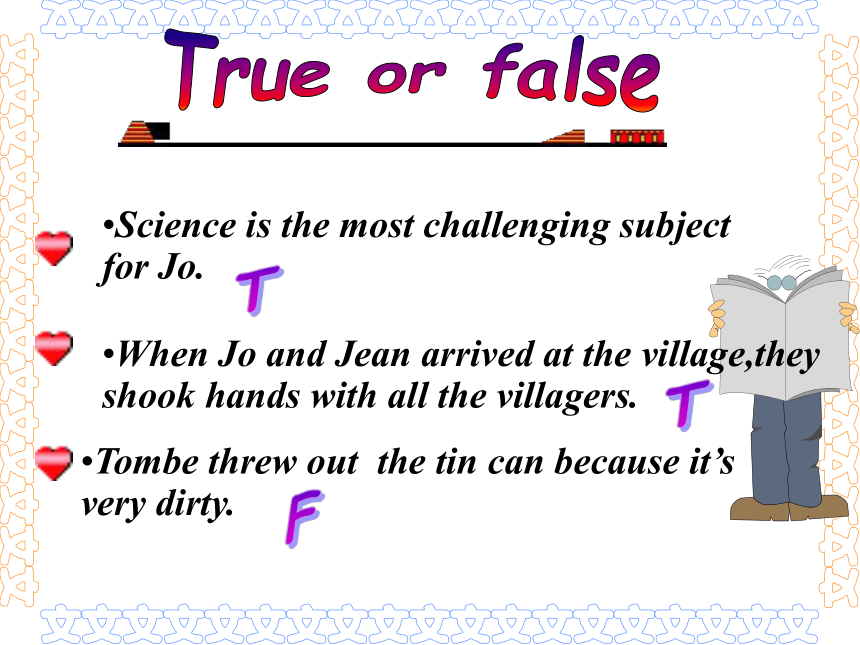
文档简介
课件59张PPT。Unit 4 SharingA LETTER HOME…each contribution — no matter how small — can help make a difference.Independent State of Papua New Guinea 巴布亚新几内亚独立国 General Information
The mainland of Papua New Guinea together with its six hundred other islands (463,000 square kilometres) has a population of approximately 5.9 million. Most of the people are Melanesian, but some are Micronesian or Polynesian. There are over seven hundred language groups, reflecting the different origins of the people. English, Tok Pisin (Pidgin), and Mom (the lingua franca (共同的语言) of the Papuan region) are the official languages.
The spectmm(范围) of Papua New Guinean society now ranges from traditional village-based life dependent on subsistence(勉强维持生活) and small cash-crop agriculture, to modem urban life in the main cities of Port Moresby (capital), Lac, Madang, Wewak, Goroka, Mt Hagen, and Rabaul. Some 85 per cent of the population directly derive their livelihood from farming, and 15 per cent of the population live in urban areas. It is estimated that the population is growing at a rate of approximately 2.0 per cent per year.巴布亚新几内亚国旗和国徽(极乐鸟 ) 巴布亚在马来语中意为“卷发人”。
16世纪中叶,葡萄牙人来到该岛时,见当地
居民和自然景观很像非洲的几内亚,故称之
为新几内亚. 首 都 :莫尔兹比港 Port Moresby
面 积 :46.2万平方公里
人 口: 430万人 语 言 :英语
?民 族 :美拉尼西亚族
宗 教 :基督教新教、拜物教
?货 币 :基那 ? 国庆节: 9月16日
?时 差 :比北京时间早2小时
?气 候 :热带雨林气候
?Helping othersTrue or falseThe classrooms are made from bricks and the roofs from grass.FIt always takes the boys only a few minutes to get to the school.FTrue or false TFTScience is the most challenging subject for Jo.When Jo and Jean arrived at the village,they shook hands with all the villagers.Tombe threw out the tin can because it’s very dirty.l. Why does Jo call the school where he teaches a bush school?
A. Because the school was built in
a bush.
B. Because the classrooms are made from bamboo and the roofs from grass.
C. Because there is nothing but bushes around the school.
D. Because students in that school use "bush" as their names.First reading2. Which of the following
statements is RIGHT?
A. There is no electricity but enough
water at school.
B. I can become used to the school' s
condition easily.
C. The students there Often do
chemistry experiments.
D. We have neither textbooks nor
any experiment equipment.
3. Which of the following sentences are RIGHT about Mukap' s house?
a. It is a low bamboo hut with grass sticking out of the roof and this shows it' s a woman' s house.
b. There were no windows and the doorway was just big enough to get through.
c. The hut was dark inside so it took time for our eyes to adjust.
d. Fresh grass had been laid on'the floor but there was an old platform.
e. That night Kiak-aras going to share the platform with us.
A. abe B. bcd C. bce D. cde 4. What can you say about the village?
The village was a place full of natural beauties. There are more trees and bamboos.
5. What can you say about life in the village?
People in the village lived a simple life. Scanning and try to divide it into four parts, and summarize what each part is about. ReadingFill in the form after your readingA. We had a meal and I saw a strange custom.
B. The experiment frightened the boys.
C. I am glad to receive Rosemary’s letter and I’ve included some photos.
D. I left and I felt privileged.
E. I saw the poor condition of the room.
F. It’s a bush school and the students live far away.C F B E A DEquippedNot equippedTable 1 (about the school)Go to college or workReturn to the villagesYesYesNoNoManyFewTable 2 (about the life in the village)Made from bamboo and the roofs from grassEveryone seemed to be a relative of each otherHeat stones first, and then put them in an empty oil drum with kau kau, corn and greens. Cover them with banana leaves and leave them to steam.Newly made platform for visitors in the father’s room; the mother usually sleep in her own hutKau kau, corn and greensA few tin plates and cups and a couple of potsDigging up peanuts with primitive tools; grow kau kau, corn and greensThey believe there are evil spirits that are usually attracted by leftover foodLanguage pointshear from sb. = receive a letter from sb.
收到某人的信
I look forward to hearing from you.
I heard from her last month.
注意:hear from后面只能接表示人的名词或代词,不可接letter作为它的宾语。
hear of/about to be told about sth. / sb.听说,得知
She disappeared and was never heard of again.
2. be dying to do / for sth. 渴望做某事;迫切想要
She is dying to go abroad.
I'm dying for a glass of water.
“渴望”的类似说法有:
be thirsty for sth.;
desire to do sth.;
have a strong desire for sth.;
long to do / for sth.3. picture n. 图画铲描绘;想象=imagine
The artist pictured her as a Spanish dancer.
I can't quite picture myself as a mother. 我不能想象自己是个母亲。
词性转换在阅读中常有出现,是增加词汇量的一种方法。如:
map:几地图
v:作图 head:几头认向……前进· hand:n.手 铲递,交
water:
n.水Y浇水 book:几书认预订 4. It takes me only a few minutes to walk to school. 我步行几分钟就可以到达学校了。
“花费时间/金钱干某事”的常用句型:
It takes sb. time to do sth.
It costs sb. money to do sth.
sth. costs sb, money
sb. spends time / money (in) doing sth. / on sth.
sb. pays money for sth
It will cost you ~ 50 to fly to Paris.
She spends two hours (in) watching TV every day. 5.adapt (oneself) to: change sth.in order to make it suitable,for a new use,etc.适应,适合
We have had to adapt quickly to the new system.我们不得不迅速适应新制度。
When you go to a new country,you must adapt yourself to new manners and customs.
注意:adapt也可表示“改编,改写”,其搭配如下:
1)adapt sth.for...改写……为……用,改编……为适合……
It is hard to adapt this story for children(the film).
要将这部小说改编为适合小孩子(电影)很困难。
2)be adapted from由....改编
This play is adapted from a novel.
常见含有to 的短语归纳如下:
be used to习惯于
be related to与……相关
lead to 导致,通向
devote oneself to献身于
give rise to引起
look forward to盼望
pay attention to注意
contribute to为……做贡献
access to接近,进入(某地的)方法
be accustomed to习惯于
be addicted to沉溺于,嗜好 6.for sure =certainly so
肯定如此,毫无疑问
She won't lend you any money,and that's for sure.她不会借钱给你,那是确定无疑的。
He'll be at the party,for sure.毫无疑问,他会参加这次聚会的。
be sure of/about确信,对…有把握
be sure of oneself有自信
make sure确信,查明,核实
to be sure的确,诚然(作插入语用)
He works slowly,to be sure,but he does a good job.
7. imaginative adj. 富有想象力的,爱想象的
an imaginative child/writer
有想象力的孩子/富有想象力的作家
imaginary adj. 想象中的,假想的
imaginable adj. 可想象的
imagine v. 设想
imagination n. 想象力
a man of rich imagination
image n. 雕像,肖像 词语辨析:
imaginative,imaginary,imaginable
imaginative:having or showing new and exciting ideas富于想象力的;创新的
We need imaginative people to put new energy into the team.
imaginary:existing only in your mind or imagination想象中的;虚构的
The story is wholly imaginary.
imaginable:(与形容词最高级或与all,every连用,表示强调或概括)想象得到的;可想象的
The house has the most beautiful views imaginable.
从这所房子可以看到所能想象的最美丽的景色。
8.come across :
to meet or find by chance
(偶然)遇见,碰见,发现(没有被动语态)
I came across children sleeping under the bridge.我偶然发现睡在桥底的孩子。
come upon 偶然遇见
=happen to meet
=meet with 与come相关的短语:
come along 快点,来吧
come around
come back 回来,折回
come from 来自, 从……来
come off 从……离开, 脱落
come out 出来, 出版
come up 走过来, 走近
come over 过来
come to 来到, 结果是, 苏醒
9.Sometimes l wonder how relevant chemistry is to the kids,most of whom will be going back to their villages after Year 8.有时我就想化学对这些孩子来说有什么关系,他们中的大多数8岁以后就将回到他们的村庄。
1)relevant 有关的;有实际重要性的
(be relevant to sth./sb.)
His age is not relevant tO whether he is a good teacher.他的年龄与他是否是一位好老师无关。
2)will be doing将来进行时,表示将来某个时候正在发生的动作。如:
I'm sure l will be studying in a university next September.我相信下一年的9月我会正在大学里学习。 3)wonder用法归纳:
wonder at…对……感到惊讶/惊奇
Everybody wonders at his doing that.
wonder about.,对……感到疑惑
Don't you wonder about his reasons for wanting money7
难道你对他缺钱的理由不感到怀疑吗?
wonder to do对做某事感到惊讶
We wondered to see her there.看到她在那儿,我们很惊奇。
wonder+that从句对……事情感到奇怪/吃惊
Can you wonder that they refused?他们拒绝了,你(会)感到奇怪吗
wonder wh·词+to do 想知道……(常译为“不知道”)
wonder wh-/if+从句 想知道……(常译为“不知道”)
I was wondering where to spend the weekend.
I wonder if you are flee人this afternoon.
(It is) no wonder+ (that) 从句:难怪,怪不得,不足为奇
No wonder that he has passed the examination.10.make a difference
有关系,有影响,起(重要)作用
(注意:根据意义,其中的a可用any,no 等来替代。)
Dollars make no difference to him.钱对他不起作用。
I don‘t think it will make any difference.
我认为那没有什么两样。11.Tombe's father led us to his house,a low bamboo hut with grass sticking out of the roof.
他的父亲领我们到他的房子,一个低矮的小竹屋,屋顶长着草。
1) stick out伸出 stick with保持密切关系;继续 stick to坚持,维持
It's rude tO stick out your tongue at others.对别人吐舌头是不礼貌的。
I will stick with my friends through thick and thin.我与朋友患难与共。
He promised to help us and he stuck to his word.他答应过帮助我们,他没有失信。stick out 突出,伸出
stick out for sth. 坚持要求某事物
stick to sth. 不放弃/改变某事物
stick at sth. 坚持不懈
stick with sb. 继续支持某人
stick up 向上突起,坚起2) “with+复合宾语(宾语+宾补)”结构在句中常作定语或状语(伴随状语或原因状语等),宾
补可由非谓语动词,形容词,副词或介词短语来充当。如:
He stared at me with his face pale.他脸色苍白地看着我。(伴随状语)
He stood with his hand in his pocket.他站着,一只手插在衣袋里。(伴随状语)
I felt sad with no one to talk to.由于没有可谈话的人,我觉得很伤心。(原因状语)
The trees with their branches reaching sky are important tO the people here.(定语)
那些树干冲天的树木对这里的人是很重要的。with的复合结构(with+ 宾语+ 宾补)
1) with + n. + doing ( doing表示 with 后名词发生的动作, 此名词为动作的执行者)
He lay there with his eyes looking at the sky. 2) with + n. + done (done 和with后面的宾语构成动宾关系, 此宾语是动作的承受者。
The thief was brought in with his hands tied back.3) with + n. + to do 动词不定式表示目的, 或将发生,未发生的事。
With all these mouth to feed, he didn’t know what to do.
With five minutes to go before the last train left, we arrived at the station.4) with + n. + prep. phrase
The teacher came in with some textbooks under her arm.
5) with + n. + adj
When he is eating, he doesn’t speak with his mouth full of food.13.dry adj. 于,于燥的 vt.(使)变于“把……)弄干
Is my shirt dry?
Be careful.Thepainthasn'tdriedyet.
dry out become/make dry(使)变干,干透
Water the plant regularly,never letting the soil dry out.
经常给植物浇水,别让土壤干透了。
dry up (of rivers,lakes,etc.)become completely dry(河流,湖泊等)干涸;(使)枯竭
During the drought the river dried叩.干旱期间,河流都干涸了。
The writer's long separation from social dried up his imagination.
长期脱离社会生活使这位作家的想象力枯竭了 15.participated vi. (+in)参加,参与
participation n.
participant n.参与者
She didn't participate in the discussion.
Children are encouraged to participate in the lives of their communities.
人们鼓励孩子们参与社团生活。16.Finance n.(for sth.)资金;财政,金融 adj. financial
Finance for education comes from taxpayers.教育经费来自纳税人.
the Minister of Finance财政部长 ‘
v:给……提供资金
The building project will be financed by the government and public donations.
这个建筑项目将由政府出资以及公众捐款
Do you know what the government and the kind people do to help poor children in our country?
how can you get accustomed to the habits that are different from yours?Post-readingSum Up stick out , dry up , relevant, adjust ,hear from ,be dying to , come across, privilege ,dry out etc .Useful words & Expressions: Reading Skills: got through the main idea of the textAbout the topic “sharing”:The description of Papua New Guinea (PNG)
What should you do if you want to help them. Homework
Finish the exercise on Page71
The mainland of Papua New Guinea together with its six hundred other islands (463,000 square kilometres) has a population of approximately 5.9 million. Most of the people are Melanesian, but some are Micronesian or Polynesian. There are over seven hundred language groups, reflecting the different origins of the people. English, Tok Pisin (Pidgin), and Mom (the lingua franca (共同的语言) of the Papuan region) are the official languages.
The spectmm(范围) of Papua New Guinean society now ranges from traditional village-based life dependent on subsistence(勉强维持生活) and small cash-crop agriculture, to modem urban life in the main cities of Port Moresby (capital), Lac, Madang, Wewak, Goroka, Mt Hagen, and Rabaul. Some 85 per cent of the population directly derive their livelihood from farming, and 15 per cent of the population live in urban areas. It is estimated that the population is growing at a rate of approximately 2.0 per cent per year.巴布亚新几内亚国旗和国徽(极乐鸟 ) 巴布亚在马来语中意为“卷发人”。
16世纪中叶,葡萄牙人来到该岛时,见当地
居民和自然景观很像非洲的几内亚,故称之
为新几内亚. 首 都 :莫尔兹比港 Port Moresby
面 积 :46.2万平方公里
人 口: 430万人 语 言 :英语
?民 族 :美拉尼西亚族
宗 教 :基督教新教、拜物教
?货 币 :基那 ? 国庆节: 9月16日
?时 差 :比北京时间早2小时
?气 候 :热带雨林气候
?Helping othersTrue or falseThe classrooms are made from bricks and the roofs from grass.FIt always takes the boys only a few minutes to get to the school.FTrue or false TFTScience is the most challenging subject for Jo.When Jo and Jean arrived at the village,they shook hands with all the villagers.Tombe threw out the tin can because it’s very dirty.l. Why does Jo call the school where he teaches a bush school?
A. Because the school was built in
a bush.
B. Because the classrooms are made from bamboo and the roofs from grass.
C. Because there is nothing but bushes around the school.
D. Because students in that school use "bush" as their names.First reading2. Which of the following
statements is RIGHT?
A. There is no electricity but enough
water at school.
B. I can become used to the school' s
condition easily.
C. The students there Often do
chemistry experiments.
D. We have neither textbooks nor
any experiment equipment.
3. Which of the following sentences are RIGHT about Mukap' s house?
a. It is a low bamboo hut with grass sticking out of the roof and this shows it' s a woman' s house.
b. There were no windows and the doorway was just big enough to get through.
c. The hut was dark inside so it took time for our eyes to adjust.
d. Fresh grass had been laid on'the floor but there was an old platform.
e. That night Kiak-aras going to share the platform with us.
A. abe B. bcd C. bce D. cde 4. What can you say about the village?
The village was a place full of natural beauties. There are more trees and bamboos.
5. What can you say about life in the village?
People in the village lived a simple life. Scanning and try to divide it into four parts, and summarize what each part is about. ReadingFill in the form after your readingA. We had a meal and I saw a strange custom.
B. The experiment frightened the boys.
C. I am glad to receive Rosemary’s letter and I’ve included some photos.
D. I left and I felt privileged.
E. I saw the poor condition of the room.
F. It’s a bush school and the students live far away.C F B E A DEquippedNot equippedTable 1 (about the school)Go to college or workReturn to the villagesYesYesNoNoManyFewTable 2 (about the life in the village)Made from bamboo and the roofs from grassEveryone seemed to be a relative of each otherHeat stones first, and then put them in an empty oil drum with kau kau, corn and greens. Cover them with banana leaves and leave them to steam.Newly made platform for visitors in the father’s room; the mother usually sleep in her own hutKau kau, corn and greensA few tin plates and cups and a couple of potsDigging up peanuts with primitive tools; grow kau kau, corn and greensThey believe there are evil spirits that are usually attracted by leftover foodLanguage pointshear from sb. = receive a letter from sb.
收到某人的信
I look forward to hearing from you.
I heard from her last month.
注意:hear from后面只能接表示人的名词或代词,不可接letter作为它的宾语。
hear of/about to be told about sth. / sb.听说,得知
She disappeared and was never heard of again.
2. be dying to do / for sth. 渴望做某事;迫切想要
She is dying to go abroad.
I'm dying for a glass of water.
“渴望”的类似说法有:
be thirsty for sth.;
desire to do sth.;
have a strong desire for sth.;
long to do / for sth.3. picture n. 图画铲描绘;想象=imagine
The artist pictured her as a Spanish dancer.
I can't quite picture myself as a mother. 我不能想象自己是个母亲。
词性转换在阅读中常有出现,是增加词汇量的一种方法。如:
map:几地图
v:作图 head:几头认向……前进· hand:n.手 铲递,交
water:
n.水Y浇水 book:几书认预订 4. It takes me only a few minutes to walk to school. 我步行几分钟就可以到达学校了。
“花费时间/金钱干某事”的常用句型:
It takes sb. time to do sth.
It costs sb. money to do sth.
sth. costs sb, money
sb. spends time / money (in) doing sth. / on sth.
sb. pays money for sth
It will cost you ~ 50 to fly to Paris.
She spends two hours (in) watching TV every day. 5.adapt (oneself) to: change sth.in order to make it suitable,for a new use,etc.适应,适合
We have had to adapt quickly to the new system.我们不得不迅速适应新制度。
When you go to a new country,you must adapt yourself to new manners and customs.
注意:adapt也可表示“改编,改写”,其搭配如下:
1)adapt sth.for...改写……为……用,改编……为适合……
It is hard to adapt this story for children(the film).
要将这部小说改编为适合小孩子(电影)很困难。
2)be adapted from由....改编
This play is adapted from a novel.
常见含有to 的短语归纳如下:
be used to习惯于
be related to与……相关
lead to 导致,通向
devote oneself to献身于
give rise to引起
look forward to盼望
pay attention to注意
contribute to为……做贡献
access to接近,进入(某地的)方法
be accustomed to习惯于
be addicted to沉溺于,嗜好 6.for sure =certainly so
肯定如此,毫无疑问
She won't lend you any money,and that's for sure.她不会借钱给你,那是确定无疑的。
He'll be at the party,for sure.毫无疑问,他会参加这次聚会的。
be sure of/about确信,对…有把握
be sure of oneself有自信
make sure确信,查明,核实
to be sure的确,诚然(作插入语用)
He works slowly,to be sure,but he does a good job.
7. imaginative adj. 富有想象力的,爱想象的
an imaginative child/writer
有想象力的孩子/富有想象力的作家
imaginary adj. 想象中的,假想的
imaginable adj. 可想象的
imagine v. 设想
imagination n. 想象力
a man of rich imagination
image n. 雕像,肖像 词语辨析:
imaginative,imaginary,imaginable
imaginative:having or showing new and exciting ideas富于想象力的;创新的
We need imaginative people to put new energy into the team.
imaginary:existing only in your mind or imagination想象中的;虚构的
The story is wholly imaginary.
imaginable:(与形容词最高级或与all,every连用,表示强调或概括)想象得到的;可想象的
The house has the most beautiful views imaginable.
从这所房子可以看到所能想象的最美丽的景色。
8.come across :
to meet or find by chance
(偶然)遇见,碰见,发现(没有被动语态)
I came across children sleeping under the bridge.我偶然发现睡在桥底的孩子。
come upon 偶然遇见
=happen to meet
=meet with 与come相关的短语:
come along 快点,来吧
come around
come back 回来,折回
come from 来自, 从……来
come off 从……离开, 脱落
come out 出来, 出版
come up 走过来, 走近
come over 过来
come to 来到, 结果是, 苏醒
9.Sometimes l wonder how relevant chemistry is to the kids,most of whom will be going back to their villages after Year 8.有时我就想化学对这些孩子来说有什么关系,他们中的大多数8岁以后就将回到他们的村庄。
1)relevant 有关的;有实际重要性的
(be relevant to sth./sb.)
His age is not relevant tO whether he is a good teacher.他的年龄与他是否是一位好老师无关。
2)will be doing将来进行时,表示将来某个时候正在发生的动作。如:
I'm sure l will be studying in a university next September.我相信下一年的9月我会正在大学里学习。 3)wonder用法归纳:
wonder at…对……感到惊讶/惊奇
Everybody wonders at his doing that.
wonder about.,对……感到疑惑
Don't you wonder about his reasons for wanting money7
难道你对他缺钱的理由不感到怀疑吗?
wonder to do对做某事感到惊讶
We wondered to see her there.看到她在那儿,我们很惊奇。
wonder+that从句对……事情感到奇怪/吃惊
Can you wonder that they refused?他们拒绝了,你(会)感到奇怪吗
wonder wh·词+to do 想知道……(常译为“不知道”)
wonder wh-/if+从句 想知道……(常译为“不知道”)
I was wondering where to spend the weekend.
I wonder if you are flee人this afternoon.
(It is) no wonder+ (that) 从句:难怪,怪不得,不足为奇
No wonder that he has passed the examination.10.make a difference
有关系,有影响,起(重要)作用
(注意:根据意义,其中的a可用any,no 等来替代。)
Dollars make no difference to him.钱对他不起作用。
I don‘t think it will make any difference.
我认为那没有什么两样。11.Tombe's father led us to his house,a low bamboo hut with grass sticking out of the roof.
他的父亲领我们到他的房子,一个低矮的小竹屋,屋顶长着草。
1) stick out伸出 stick with保持密切关系;继续 stick to坚持,维持
It's rude tO stick out your tongue at others.对别人吐舌头是不礼貌的。
I will stick with my friends through thick and thin.我与朋友患难与共。
He promised to help us and he stuck to his word.他答应过帮助我们,他没有失信。stick out 突出,伸出
stick out for sth. 坚持要求某事物
stick to sth. 不放弃/改变某事物
stick at sth. 坚持不懈
stick with sb. 继续支持某人
stick up 向上突起,坚起2) “with+复合宾语(宾语+宾补)”结构在句中常作定语或状语(伴随状语或原因状语等),宾
补可由非谓语动词,形容词,副词或介词短语来充当。如:
He stared at me with his face pale.他脸色苍白地看着我。(伴随状语)
He stood with his hand in his pocket.他站着,一只手插在衣袋里。(伴随状语)
I felt sad with no one to talk to.由于没有可谈话的人,我觉得很伤心。(原因状语)
The trees with their branches reaching sky are important tO the people here.(定语)
那些树干冲天的树木对这里的人是很重要的。with的复合结构(with+ 宾语+ 宾补)
1) with + n. + doing ( doing表示 with 后名词发生的动作, 此名词为动作的执行者)
He lay there with his eyes looking at the sky. 2) with + n. + done (done 和with后面的宾语构成动宾关系, 此宾语是动作的承受者。
The thief was brought in with his hands tied back.3) with + n. + to do 动词不定式表示目的, 或将发生,未发生的事。
With all these mouth to feed, he didn’t know what to do.
With five minutes to go before the last train left, we arrived at the station.4) with + n. + prep. phrase
The teacher came in with some textbooks under her arm.
5) with + n. + adj
When he is eating, he doesn’t speak with his mouth full of food.13.dry adj. 于,于燥的 vt.(使)变于“把……)弄干
Is my shirt dry?
Be careful.Thepainthasn'tdriedyet.
dry out become/make dry(使)变干,干透
Water the plant regularly,never letting the soil dry out.
经常给植物浇水,别让土壤干透了。
dry up (of rivers,lakes,etc.)become completely dry(河流,湖泊等)干涸;(使)枯竭
During the drought the river dried叩.干旱期间,河流都干涸了。
The writer's long separation from social dried up his imagination.
长期脱离社会生活使这位作家的想象力枯竭了 15.participated vi. (+in)参加,参与
participation n.
participant n.参与者
She didn't participate in the discussion.
Children are encouraged to participate in the lives of their communities.
人们鼓励孩子们参与社团生活。16.Finance n.(for sth.)资金;财政,金融 adj. financial
Finance for education comes from taxpayers.教育经费来自纳税人.
the Minister of Finance财政部长 ‘
v:给……提供资金
The building project will be financed by the government and public donations.
这个建筑项目将由政府出资以及公众捐款
Do you know what the government and the kind people do to help poor children in our country?
how can you get accustomed to the habits that are different from yours?Post-readingSum Up stick out , dry up , relevant, adjust ,hear from ,be dying to , come across, privilege ,dry out etc .Useful words & Expressions: Reading Skills: got through the main idea of the textAbout the topic “sharing”:The description of Papua New Guinea (PNG)
What should you do if you want to help them. Homework
Finish the exercise on Page71
